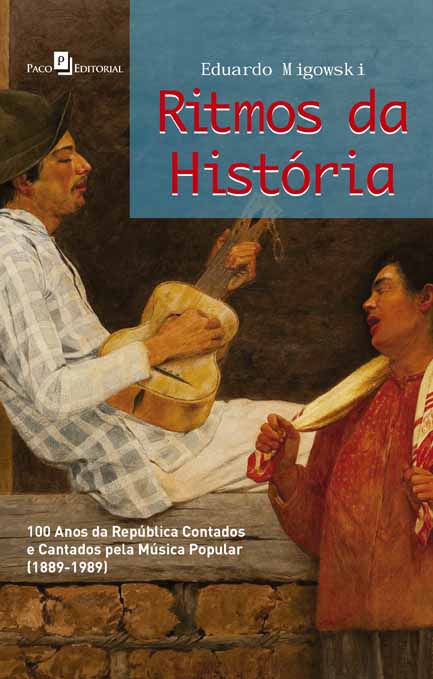Music has always been part of the story. Early indications arise in Prehistory, with the descendants of the men imitating the sounds of animals and nature. Therefore, as our companion forever, nothing better than to use music to tell a bit of history. With a focus on the history of Brazil, this is what the book seeks Rhythms of History, historian Eduardo Migowski, that book signing in Rio de Janeiro, on Wednesday, day 18, Bookshop Argument (Rio Design Center - Av. of the Americas, 7777 Out da Tijuca, RJ)
Rhythms of History – 100 years of the republic counted and sung by folk music (1889-1989), 340 pages, Editorial Paco, R$ 52,90, is an interpretation of Brazil's rich history and troubled politics, by culturing, specifically, from music. The goal is to understand the more than 100 years of the republic and all the twists and turns of this trajectory. Few artistic expressions carry as many fragments of a people as music. From the biggest and best-known exponents, as during the dictatorship, to your day to day routine more, highlighting the fact that what the people sing quite expresses what he lives.
The Brazilian story is well known, and it has been retold many times, by numerous views. So that now, this book has new content, telling the same story from an unexplored point of view. Therefore, this is not a book about music. It is a work that uses music to help the reader to know Brazil. That's what the book brings more different and unique. Add two topics that are intrinsically linked – politics and culture – in a manner that has never been seen.
How art reflects the time and the political and, more important, the interpretation of the people regarding these issues, Rhythms of History – 100 years of the republic counted and sung by folk music (1889-1989) brings a unique study, with a dip in mindset and perception of the people in some of the most famous moments in our history.
With simple language and compelling read, well analogies that seek to facilitate the understanding and the country context related to seasons, the edition covers practically our entire history. It starts with a contextualization of what Brazil is, following general aspects of our history.
Brazil is the product of two main features: large farms and a population ruled by slave labor. The aim of the book is not to tell the story that has been told, but what did the population that lived at this moment thought?. This purpose is made clear in one of the first excerpts of the book.. While it sounds the cry of freedom that gives the Brazilian Republic, what does this term mean to a population that, until then, only knew the slave labor? It's questions like this that Rhythms of History seeks to answer.
Sign up to receive Event News
and the Universe of Arts first!
To be published, the work went through an editorial board for history publications, composed of several professors and teachers from all over Brazil.
The author
Eduardo Seixas Migowski, History teacher and historian, a master's degree in Philosophy from PUC-RJ. Eduardo is also the author of the book Government of Crowds: population and power in Michel Foucault, by publisher Multifoco, 2017. Currently, pursuing a doctorate in political science at the University Federal Fluminense.
Launch: on wednesday, 18 of december, 19 hours – Bookstore argument River Information Center - Av. of the Americas, 7777 Out da Tijuca, RJ
| Rhythms of History – 100 years of the republic counted and sung by folk music (1889 |
| 1989), Eduardo Seixas Migowski 340 pages, Editorial Paco, R$ 52,90 |
| Paco and Littera Publisher – Av. Dr. Carlos Salles Block, 658 island 12 and 21 – Anhangabaú – Jundiaí, SP CEP: 13280-100 |
| www.pacolivros.com.br twitter.com/Paco_Editorial www.facebook.com/PacoEditorial www.instagram.com/pacoeditorial |
| Phones: (11) 4521-6315 / (11) 98599-3876 |



